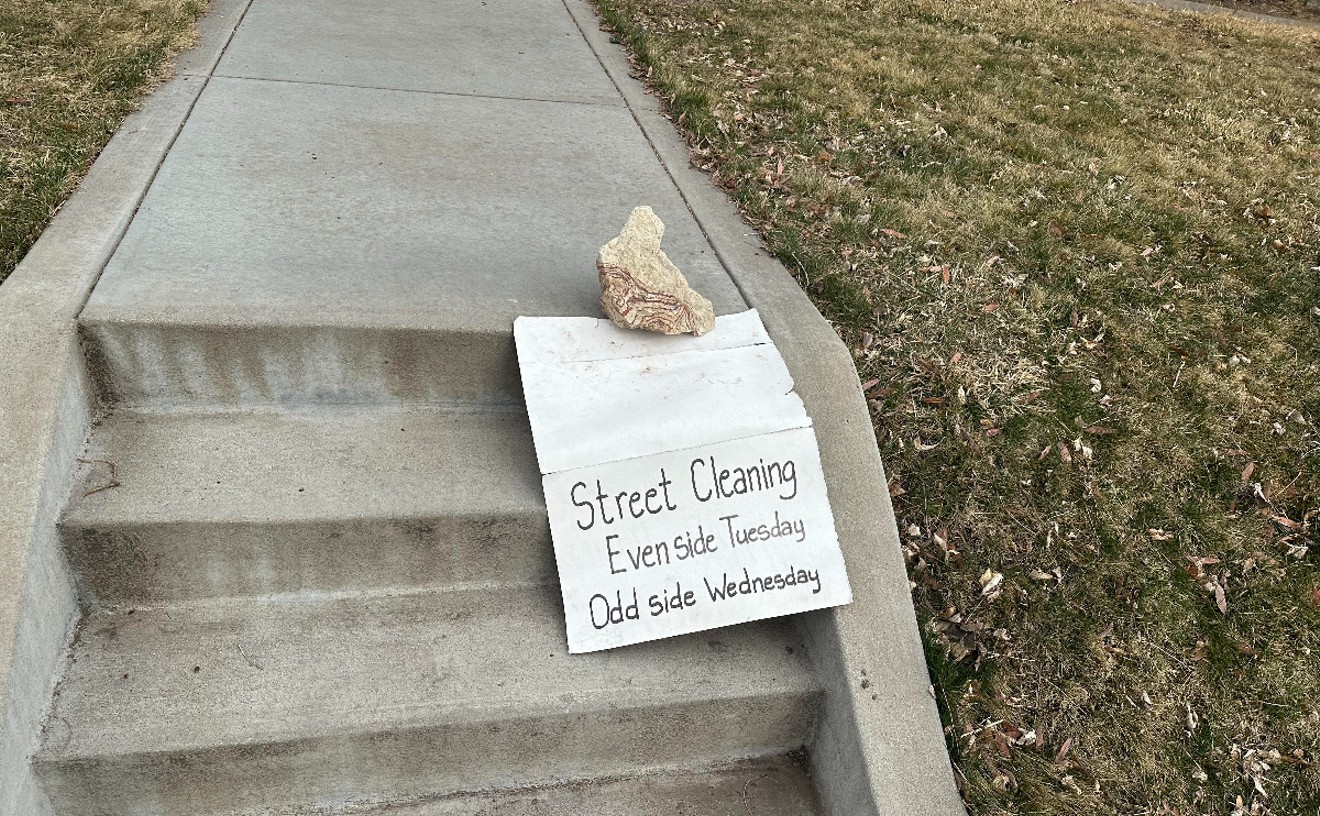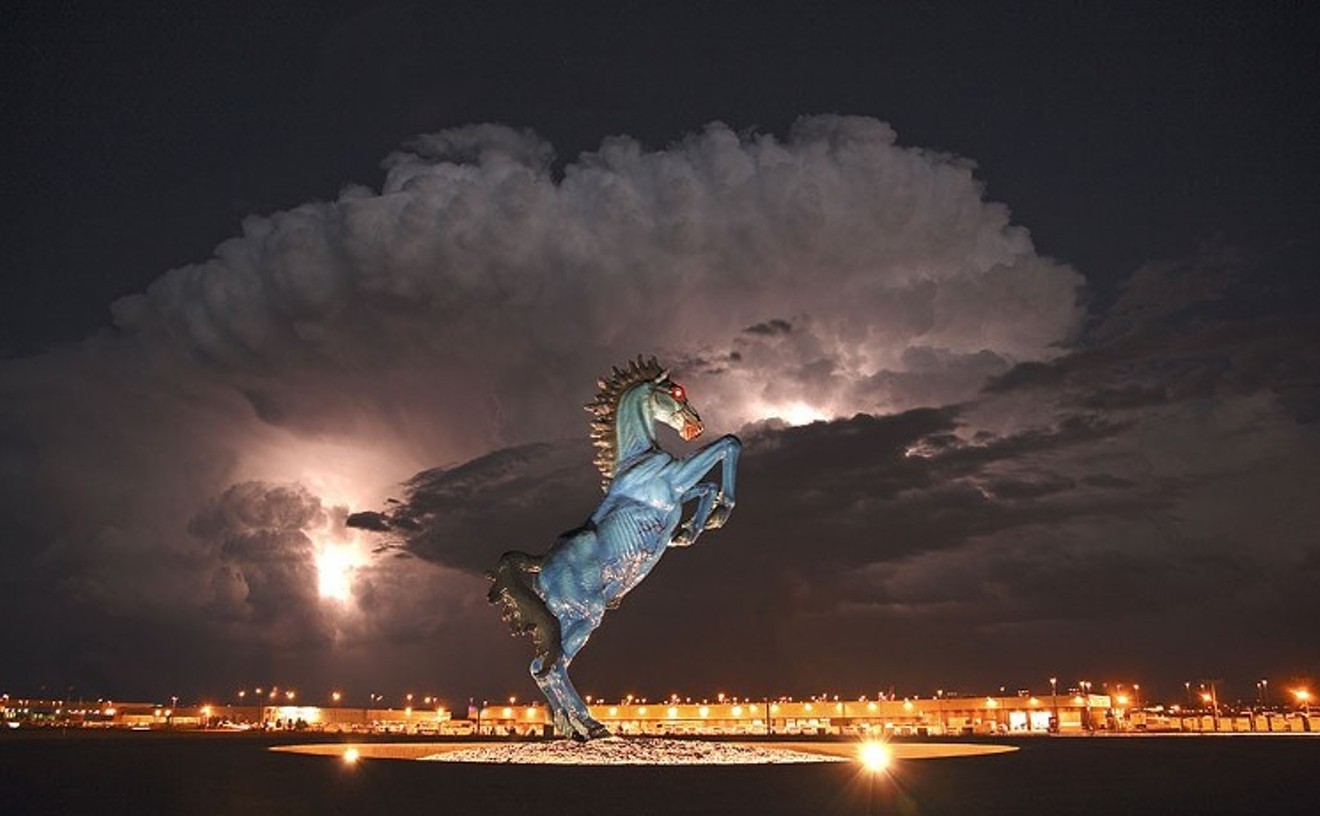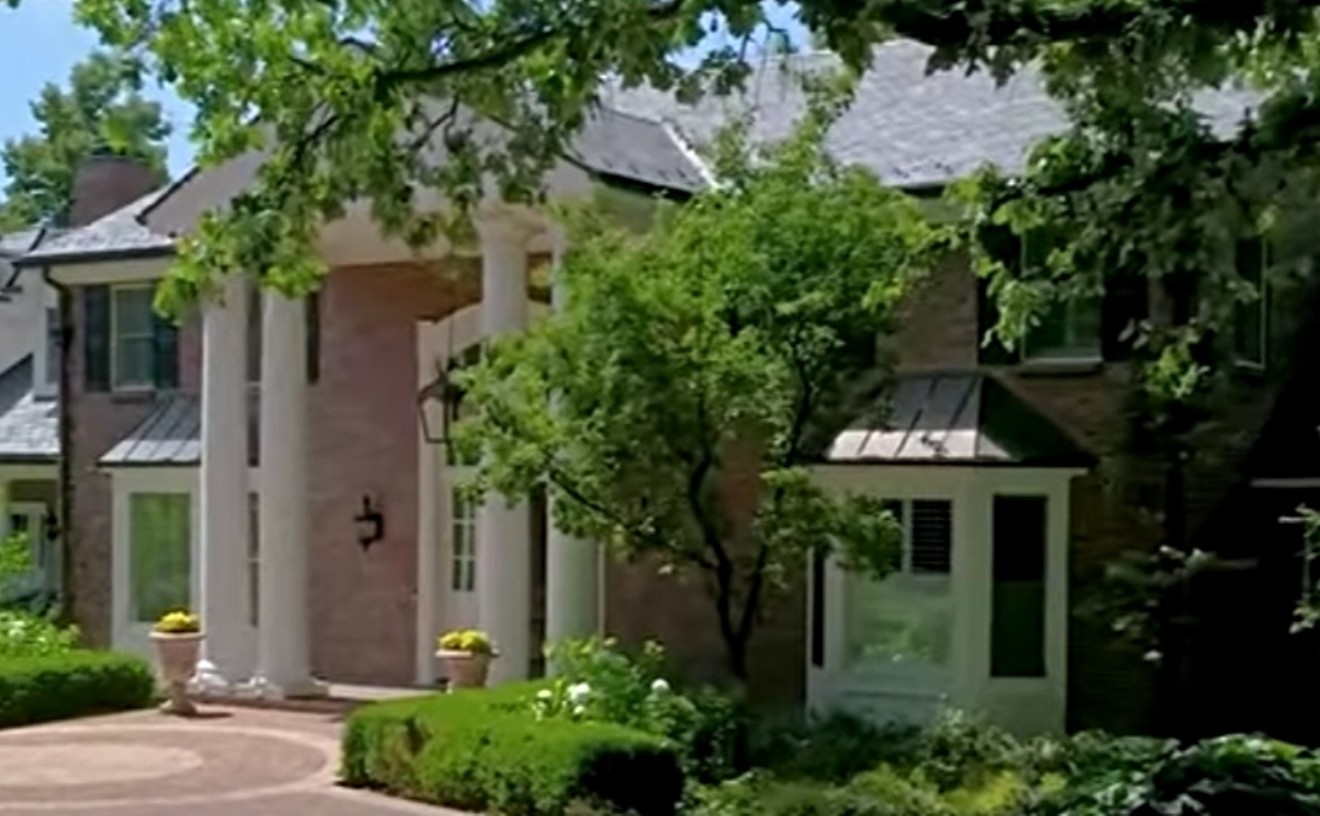Coach Robert Baca is ready to fight. He's all business — calm and poised, dressed in slick patent-leather dress shoes, pressed slacks and a blazer, his signature stone face looking out at the crowded community room — but the name of the game peeks out from beneath his jacket, where a T-shirt emblazoned with the words "20th Street Gym Boxing" stretches across his chest like a yet-to-be-fully-revealed superhero's uniform.
Baca is here to fight for his team: 20th Street Gym Boxing, a legendary Denver institution that's lasted for nearly seventy years in the century-old 20th Street Recreation Center. But the future of the program is now in jeopardy, as the city is restructuring all of the fitness programs housed in Denver Parks and Recreation facilities. Boxing is viewed as a "niche" program, and since it's not offered citywide, there's a question of whether it will continue at 20th Street at all.
The community has gathered at the Glenarm Recreation Center, close to 20th Street, to discuss the possible restructuring of the boxing program. In one corner are Baca and his students, in the other representatives of Parks and Recreation. Councilwoman Judy Montero, who represents District 9, where 20th Street is located, is here to referee.
Although the city is definitely a formidable opponent, Baca's team has the power of the 20th Street Gym's reputation. Heavyweight champion Sonny Liston worked out at 20th Street in the early 1960s, when he lived in the area; former lightweight champion Stevie Johnston started out there. So did current welterweight contender Mike Alvarado. It's more than just a downtown gym; it's a place where history has been made — and where Baca wants to make sure that history doesn't end. But this fall, when the 20th Street Recreation Center was closed for renovations, he learned that the competitive boxing program might be knocked out of the ring.
**********
Shon Mondragon was 20th Street's rising star until the boxing program was shut out of the facility this fall. Baca found a temporary home for his team at a Colorado Golden Gloves boxing gym a few miles away in Wheat Ridge, but a lot of his young athletes — many of whom took the bus to downtown Denver from Park Hill and other areas — didn't have a way to get to the western suburbs.
Shon did. His parents, Shon and Cassandra Mondragon, are with him at every practice and every fight, and will drive their son wherever he needs to go in order to be with his coach.
Sixteen-year-old Shon is slight for his age, but his power is undeniable. He's also polite, well-spoken and gracious: He walks right up, shakes hands with a firm grip and introduces himself. He has a complete understanding of what it takes to be a fighter, inside and outside of the ring. He's ready to be a champion.
"He's had a lot of disappointing decisions," says Baca of Shon's early boxing career, "but we've just kept plugging along, and I think it has really built Shon's character. He's never been discouraged, and now he beats guys, no question."
Come January, Shon will be back in the ring, competing in the seventeen-to-eighteen-year-old age group of the Youth National Team Open in Reno. If he wins, Shon will go on to become part of a national team that competes all over the globe. He's currently second in the nation for his age and weight class; Baca says the only reason Shon isn't on top is because he hasn't had the chance to prove himself yet. "He's only number two because we haven't fought the number-one guy," Baca points out. "Once we fight him, we'll be number one."
Baca says this as though the fight were already in the bag, but he's got the numbers to back up the boast. Shon's 2013 record is nineteen wins and two losses; overall, he has forty-two wins and twelve losses under his belt.
Shon started boxing four years ago, in October 2009, just before he turned twelve. Baca has been his only coach, 20th Street his only gym. "He started from scratch; he didn't know a thing about boxing," Baca says. "He didn't even know how to stand, throw a punch, anything. I brought him from scraps to number two in the country."
"When Coach Baca first took Shon, after a couple of practices, Coach looked at me and said, 'Within two years, you'll have a national champion,'" Cassandra Mondragon remembers. "As a mother, it's like, well, that's great to hear, but you don't want to get too..." She pauses. "But, sure enough."
Sure enough, Shon delivered, and became the star boxer Baca had envisioned.
"I love boxing," Shon says, grinning. "It gets me out of trouble."
Shon Sr. marvels at his son's dedication. "I don't know any other fifteen-, sixteen-year-old who takes off and does what he does — not just because he's my son," he says. "But he just takes off and does three-and-a-half-, four-mile runs on his own every night before practice. It's hard to believe. I mean, me as a fourteen- and fifteen-year-old? I would have never done that."
Young Shon had started out with the usual team activities — soccer, football, baseball and basketball — but at the age of eleven, he told his father that he was bored with them. "He was real quiet, and in sports, he was a hide-behind-the-team kind of guy," says Shon Sr. So his revelation that he wanted to box came as a surprise.
Boxing had always been a family spectator sport: Shon's great-grandfather, John Ulibarri, had been an integral part of Colorado Golden Gloves, serving on the board of directors and even as executive director of the organization before he retired. Shon had seen plenty of fights in his life, and his parents recall Ulibarri putting young Shon in the ring, fists up, for photos. But when Shon decided that boxing was his sport, he didn't realize how deep the tradition ran in his family.
Those family ties were what connected him to Baca. "I called my grandfather, who's been in this for years and knows all the coaches," remembers Cassandra. "I said, 'Hey, Grandpa, Shon wants to box. Who do you think will be the best coach for him in Denver?' He thought for a minute, then he said, 'Honestly, there are a lot of good coaches, but I would recommend Robert Baca. He's out of 20th Street. You should go try him out.' At that point, we went to 20th Street, and we never looked back."
Like Shon Mondragon, Robert Baca started boxing when he was a kid. And like Shon, he had his first amateur match at the 20th Street Gym, where the words "House of Pain" hung above the door leading to the second-floor ring.
Baca was fourteen when he began boxing in 1971, when the sport had a lot more clout. "Parishes and rec centers — everyone had teams back then," he recalls. "We started our team in the basement of the church at St. Dominic's. We built from there."
That led to bouts at 20th Street and also Denver Elks Lodge No. 17, the first lodge established between the Mississippi River and the Golden Gate Bridge. The gym at 14th and California streets was known as the "Punchbowl"; it had been hosting boxing tournaments since the early 1900s. The last one was in 1974; the lodge was later scraped and replaced by a parking lot.
"That building was the best spot in the country for boxing," Baca says. "It was an intimate arena — you could be right on top of the action." He remembers competing in tournaments that lasted six days, sometimes fighting twice a day, because hundreds of athletes would sign up. "To win a state championship back then was really something," he adds.
And he did win them, taking the B Class and the Open Class A championships in 1974. Those wins brought him closer to his goal of competing in the 1976 Olympic Games.
"I made a lot of sacrifices in my life to do that," says Baca. "I went to Regis Jesuit High School; it was hard academically, but I still boxed. In my senior year, I worked all the way through. I walked the walk and talked the talk."
He talked the talk with best friend at Regis, Charles Martinez, who would later marry Joyce Ulibarri, John Ulibarri's daughter, and connect Baca to Shon Mondragon.
After taking the Open Class State Golden Gloves Tournament, Baca won the Light Middleweight title at the 1975 regional Olympic trials. The Open Class was an unusual victory for someone as young as Baca, who was just eighteen and fresh out of high school; it usually attracted much older boxers.
"Everybody in the five-state area knew me; everybody knew that I was going to the Olympics," recalls Baca. "I used to knock guys out cold. I'm not ashamed to say that, because it just proves my technique. When you go in the ring, you go in to test your skills. You offer yourself as a test to your opponent. That's where the respect comes from."
His Olympics hopes ended when his opponent head-butted him.
"We didn't wear headgear in those days," Baca remembers. "I suffered a really bad concussion. Even though I won the match, I couldn't continue boxing. My doctor strongly advised that I needed to quit for a while. That was the end of my dream, right there."
Baca took a few years off from boxing, got married and started a family. He returned to the game when he was 23 and won the 1980 Colorado Golden Gloves title, but the sport proved too time-consuming for the new father. Instead, he threw his energy into his work, building a career overseeing IT departments for MCI and Eastman Kodak and ultimately earning six figures annually. But even after two and a half decades of success in the private sector, he never forgot what it felt like to be in the ring.
And then his eighteen-year-old daughter, Amorena, told her father that she wanted to box. Baca said he knew of some good coaches he could take her to, but Amorena refused. She wanted her dad to teach her the ropes.
Baca saw his daughter growing up, slipping out of his hands. He wanted her to succeed more than he wanted his corporate career. "I just gave it up," Baca says.
He called on his old friends and was given the basement of Lodge No. 17 (now relocated to 26th Avenue and Alcott Street), where he started Amorena's training in December 2001. "It was my daughter and I and a medicine ball," Baca remembers. Still, from those humble beginnings, he built a team.
Then, in December 2004, he heard of an opening for a boxing coach at the legendary 20th Street Gym. He applied and got the job.
**********
By then, the 20th Street Boxing program was more than sixty years old; students of all ages and economic backgrounds had been training at the modest facility in the heart of downtown.
"Boxing is a poor man's sport," says DaVarryl Williamson, a national heavyweight champion who lives in Aurora and is a strong supporter of 20th Street. But rich or poor, anyone could learn to fight at 20th Street; no prior training was required. "20th Street Gym is like the Brown Palace," says Williamson, "except they host presidents and we have boxers."
Under Baca, the program was free to any child under the age of seventeen with a Parks and Rec membership. And that rec pass was also free for Denver kids under the MyDenver program, which currently gives them access to 26 rec centers and 29 pools. But the rest of the rules are changing, as is the part of Denver where the 20th Street Recreation Center is located.
It's been more than a decade since the "House of Pain" sign hung over the door to 20th Street's boxing gym. As more upscale residents started moving downtown, the clientele of this recreation center shifted, and its focus has altered. A recent two-week renovation removed the regional-championship banners that used to hang from the rafters. Also gone are action shots of Shon Mondragon and other students in the boxing program that had been tacked to a bulletin board alongside cut-out newspaper articles about 20th Street's boxing legacy and updates on the program's local and national rankings. An elevated ring still sits in the center of the room, with wall mounts for two speed bags on one side, a heavy bag and a lighter bag hanging from the ceiling, and a painted scene of two boxers mid-match on the back wall. It's clear that this was once a boxer's gym — but these days, the city promotes the boxing fitness classes at 20th Street rather than the boxing program.
As Erin Brown, deputy manager of Parks and Recreation, explains: "We looked at everything in our system to see, does it fit? If it doesn't fit there, where is our niche? Who is offering it? Boxing is one of those things that isn't a niche for Parks and Rec, so we had someone offering it. Then we recognized that we have these partners, so we have to look at what the rules look like, and they vary all across the board. We had to clean up across our system — we didn't just single out boxing."
But nothing else in the Parks and Rec system has the boxing program's knockout reputation.
**********
When Baca's program had to leave 20th Street this fall, the Colorado Golden Gloves Charities Gym in Wheat Ridge opened its doors to the team. That accommodation speaks volumes about the sportsmanlike conduct of this game. In the ring, the action may look barbaric, but both inside and outside of the ropes, everyone is treated with respect.
Golden Gloves of America was started in 1928 as a way for amateur boxers to compete nationally. The organization was key in pushing the popularity of the sport, giving amateur fighters around the country a platform from which they could rise to the world's stage. The Colorado branch of Golden Gloves was established in 1944 and started fielding teams of amateur fighters ranging in age from sixteen to sixty. Though today there are nowhere near the number of competitors coming out of the amateur circuit that there were decades ago, organizations like Golden Gloves are helping to keep the sport alive.
One warm Saturday this fall, competitors from all over Colorado, as well as nearby states such as Wyoming and Kansas, converge on the Golden Gloves boxing gym in Wheat Ridge for a "local show," a full day of matches. Boys and girls as young as eight years old will go head-to-head with competitors matching them in age and weight class. Adults, too, are part of this amateur circuit; although the sport of boxing doesn't have nearly the clout that it did four decades ago, it still supports a strong community that observes all the traditions.
As each set of boxers enters the ring, the fighters greet one another face-to-face. Some even cross over to the opposing corner to introduce themselves to a competitor's coach, or walk the perimeter of the roped-off stage to say hello to the judges who will be calling the match. Judges sit on all four sides of the ring, wearing white-collared shirts and holding pens and paper.
The judges surround the ring because at the amateur level, the competitions are no longer about knockouts: Each round is about skill and precision. Rather than the old "punch count" scoring system, in which each actual punch by a competitor was counted toward an overall score, Golden Gloves recently introduced a ten-point system. Judges consider a boxer's overall aggressiveness and action in a fight, how controlled each movement is, and, of course, how many clean, hard blows are landed. Based on these criteria, a winner will receive a score of ten points; the opponent gets zero. As with a knockout, it's all or nothing.
Families settle into every available seat in this makeshift arena — which doubles as the Golden Gloves practice gym during the rest of the week — and proud parents shout a mix of instructions and encouragement from the sidelines.
"Uppercut, son! Uppercut!" one father yells, while another hollers, "Don't be so predictable!"
The matches will go on for hours, kids and adults alike duking it out for the chance to compete nationally and, in some cases, internationally.
In a back corner of the Golden Gloves gym, behind rows of enthusiastic parents and fidgety younger siblings, members of the 20th Street Gym boxing team wait their turns. The athletes range in age from ten to 33; by the time the tournament ends, all four of the team's competing boxers will be taking home ten-point wins.
But what home will they take them to?
**********
The community meeting that Baca has called on November 6 at the Glenarm Recreation Center is tense.
Baca's family — including his daughter, Amorena, now ranked eighth in the country in her weight class; her eight year-old son; and the coach's father, Armando Baca — makes up a good portion of the full house. Shon Mondragon and his parents, Shon and Cassandra, are here. So is former heavyweight champ Williamson, as well as coaches and officials from Colorado Golden Gloves, Baca's boxing students and assorted supporters. They're all waiting to see what the first punch will be from the Department of Parks and Recreation.
Deputy Manager Brown presents two plans for how Baca could run the formerly free boxing program at the 20th Street Recreation Center. Option one would make Baca a program "partner": Essentially, he would rent the facility from the city and put on the program himself. To sweeten this deal, the city would offer a year of free rent at the 20th Street Gym, then 50 percent off for the second year; after that, they would talk about price. (These rates are greatly reduced from what the city suggested earlier this fall.) Baca would be responsible for the program's structure, setting fees and tuition rates — and paying for insurance. He would also no longer be an employee of Denver Parks and Recreation.
Brown stresses that Baca's "dedicated following" could help him find outside funding, and points out that this option would leave all decisions about the 20th Street program in his hands. But the crowd grumbles, with various members of the audience shouting about how this "restructuring" is "just about money" for the city and could mean "the end" for the program.
The second possibility is aligning the 20th Street boxing program with similar programs in the Denver Parks and Recreation curriculum, which would allow Baca to remain a city employee. But the city would set the rules and the fees. Participants would have to sign up for each session (which typically run in three- to eight-week segments throughout the calendar year); they would also have to pay for each session. Students under eighteen would pay $54 per eight-week session; adults would pay $84 per eight-week session. Participants could apply for P.L.A.Y. (Parks and Rec Looking to Assist You) financial aid, Brown notes. "We use the same sliding scale as Human Services," she explains. "These are fees posted in the municipal code; they are not arbitrary fees we've just decided to charge the program. It was never at all the intent of Denver Parks and Rec to get rid of the boxing program. Our intent is to align our program based on state, federal and municipal laws and code. The way it was currently operating was not appropriate. It put the city at risk."
Before he offers his response, Baca asks all of the program's current and former students in the room to join him. Close to half the people in the audience leave their seats to stand with their coach — elementary-age boys and girls, teenagers, moms, dads, even grandfathers. "This is what the program is really all about," Baca says, as little boxers crowd around his legs, looking up at their coach.
"We're all part of a family — whether it is our own team or if we're at competitions. We are all very respectful," says Baca. "Once these boxers get in the ring to compete, there is a mutual respect; that carries on to the families watching. It's why we have such a good reputation."
A reputation that deserves better than the options on the table, he adds.
"Slowly through the years, [Parks and Rec] has cut back the hours and cut back the equipment," Baca continues. "Now this — the final blow of making it pretty much unaffordable to continue. We have great kids here. We're being supportive, we're doing the right things, and all of a sudden, due to city restructuring, it feels like these 'parents' who wanted to take care of us want to disown us. It is a heartbreaking feeling to be cast aside like this, after all of the good in the community we provide for these kids, who go on to become outstanding members of this community."
But just as he teaches his students to stay strong and respect their opponents, he promises to do the same for 20th Street Boxing, a Denver institution. Baca won't go down without a fight.











